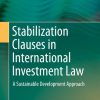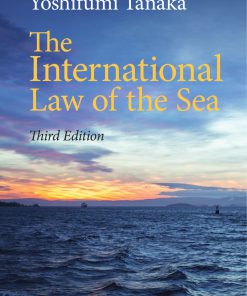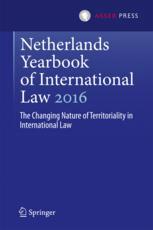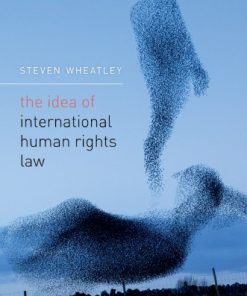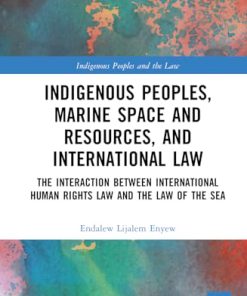The Sources of International Law Hugh Thirlway 0192578928 9780192578921
$50.00 Original price was: $50.00.$25.00Current price is: $25.00.
This completed downloadable of The Sources of International Law Hugh Thirlway
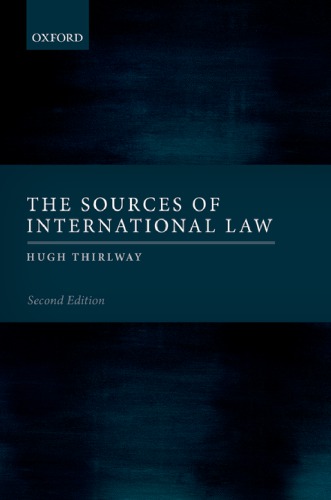
Instant downloaded The Sources of International Law Hugh Thirlway pdf docx epub after payment.
Product details:
- ISBN 10: 0192578928
- ISBN 13: 9780192578921
- Author: Hugh Thirlway
This new edition of Hugh Thirlway’s authoritative text provides an introduction to one of the fundamental questions of the discipline: what is, and what is not, a source of international law. Traditionally, treaties between states and state practice were seen as the primary means with which to create international law. However, more recent developments have recognized customary international law, alongside international treaties and instruments, as a key foundation upon which international law is built. This book provides an insightful inquiry into all the recognized, or asserted, sources of international law. It investigates the impact of ethical principles on the creation of international law; whether ‘soft law’ norms come into being through the same sources as binding international law; and whether jus cogens norms, and those involving rights and obligations erga omnes have a unique place in the creation of international legal norms. It studies the notion of ‘general principles of international law’ within international law’s sub-disciplines, and the evolving relationship between treaty-based law and customary international law. Re-examining the traditional model, it investigates the increasing role of international jurisprudence, and looks at the nature of international organisations and non-state actors as potential new sources of international law. This revised and updated book provides a perfect introduction to the law of sources, as well as innovative perspectives on new developments, making it essential reading for anyone studying or working in international law.
Table of contents:
I. The Nature of International Law and the Concept of Sources
1. Introduction
2. Formal and material sources
3. Enumeration of the recognized formal sources
4. Nature and operation of the sources
5. Whose law? States and non-State actors
6. Are there additional formal sources, not in Article 38?
6(a) Unilateral acts
6(b) Decisions of international organizations
6(c) Agreements between States and international enterprises
6(d) Other proposals
7. Religious law as a rival or additional source
8. Is the theory of sources still sufficient?
II. Treaties and Conventions as a Source of Law
1. Pacta sunt servanda
2. The limits of treaty-law: jus cogens and the relative effect of treaties
3. Commitment to the treaty-obligations
4. Unilateral acts as inchoate treaties?
III. Custom as a Source of International Law
1. Introduction
2. Constituent elements of custom
2(a) Two elements or one?
2(b) State practice
2(c) The opinio juris
2(d) The role of international organizations
3. Changes in customary law
4. The relevance of ethical and similar principles to customary law
5. The extent of application of a rule of customary international law
5(a) General customary law and the ‘persistent objector’
5(b) Particular customary law
IV. General Principles of Law as a Source of Law
1. What are the ‘general principles of law’?
2. The role of equity
3. General principles of law and non liquet
V. The Subsidiary Sources
1. Introduction
2. Judicial decisions
2(a) International tribunals
2(b) Municipal courts
3. The teachings of publicists
VI. Interaction or Hierarchy between Sources
1. Simultaneous and identical obligations under treaty and under customary law
2. The ‘hierarchy of sources’
VII. Specialities: jus cogens, Obligations erga omnes, Soft Law
1. Superior norms and their sources: jus cogens and obligations erga omnes
1(a) The source or sources of obligations erga omnes
1(b) The source or sources of norms of jus cogens
2. Soft law
VIII. Subsystems of International Law
1. ‘Self-contained regimes’ and their limits
2. Human rights law
2(a) Human rights law under treaty and as custom
2(b) Human rights as deriving from general principles
2(c) Human rights and Islam
3. Humanitarian law
3(a) Treaties and conventions
3(b) Customary law or an independent source of law?
4. WTO, ICSID: trade and investment law dispute settlement
5. International environmental issues
6. International criminal law
IX. Some Alternative Approaches
1. Inadequacy or irrelevance of recognized sources
2. The role of ethical principles
3. The insufficiencies of the theory of international customary law
X. A Brief Note in Conclusion
People also search:
international law about war
international law about human rights
international law about occupation
international law about environment
international law about genocide
You may also like…
Jurisprudence & Law
The International Law of the Sea 3rd Edition Yoshifumi Tanaka
Commercial & Financial Law
Jurisprudence & Law
Jurisprudence & Law - Constitutional Law
Business & Economics - Mathematical Economics
Politics & Philosophy - Social Sciences
Reference - Writing
Politics & Philosophy - Government & Politics
Boundaries of the International Law and Empire Jennifer Pitts
Politics & Philosophy - Anthropology



